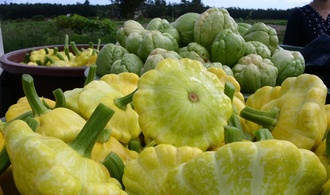A New Project: Suppression of the melon fly in selected areas of Mauritius
Rédigé par Modifié le
The melon fly ( Bactrocera cucurbitae) is an important fruit fly species that causes significant damage to cucurbits, in particular cucumber, squash, pumpkin, bittergourd, snakegourd, chayote, courgette. About 30% of the annual production is damaged by this insect pest. However, the use of insecticides alone does not give effective control.
A melon fly suppression programme funded jointly by FAO-IAEA (Food and Agricultural Organisation - International Atomic Energy Agency (IAEA) and the Republic of Mauritius is being implemented in collaboration with the Agricultural Research & Extension Unit (AREU) and cucurbit growers.
The project started in 2007 and aims at producing high quality cucurbit fruits with environment friendly techniques. For the implementation of the pilot project, the Plaine Sophie area (situated in the south of the island) has been chosen. This area covers about 110 hectares cultivated by 135 planters. The various components of the project include (i) sensitization campaign of cucurbit growers; (ii) preparation of extension materials; (iii) monitoring of melon fly population; (iv) distribution of fruit cages to growers for sanitation; (v) free distribution of bait mixtures and killer blocks; (vi) mass rearing and release of sterile flies.
Planters have been trained on field application of protein baits and placement of killer blocks in their respective fields and proper sanitation methods, use of trap crop to improve the efficacy of bait sprays. The trap crop provides sites for shelter and roosting of melon flies and concurrently bait sprays will give optimal effectiveness. In this respect research is being carried out extensively on trap crop species attractive to melon flies and acceptable to growers. Planters are being encouraged to apply protein bait regularly and use killer blocks. Emphasis is being laid on collection and disposal of infested fruits.
So far, results from trap catches (dry and wet) placed in the whole area, show that the population of melon flies has considerably decreased during the period of June to December 2007. A good response is being obtained from planters. Most of them are following the recommendations. Some growers claimed to have obtained an increase in both quality and quantity of fruits. Furthermore, the number of pesticide applications for a crop cycle has been reduced by at least half.
It is envisaged to introduce the parasitoid, Psyttalia fletcheri from Reunion Island to provide additional control of melon fly. Presently, the melon fly is being mass reared in the laboratory in view of integrating the use of sterile insect technique for the suppression of this insect.


